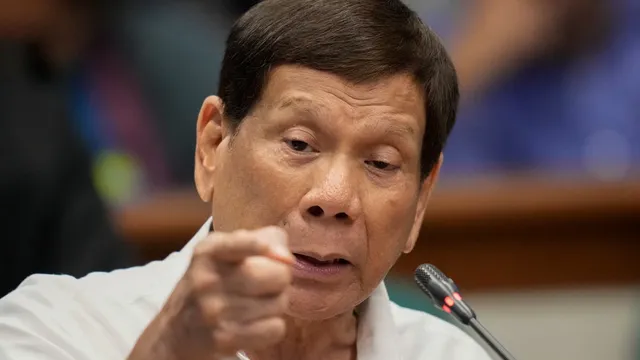
Rodrigo Duterte faces international court for drug war murders
2025-03-14 15:05- Rodrigo Duterte was arrested in Manila and subsequently transferred to the International Criminal Court in the Netherlands.
- He faces charges related to murder and crimes against humanity during his presidency's anti-drug campaign.
- Duterte's court appearance marks a historic moment for victims' families seeking justice against state violence.
Express your sentiment!
Insights
In the Netherlands, former Philippine President Rodrigo Duterte made an appearance via video link at the International Criminal Court following his arrest in Manila on charges linked to his controversial 'war on drugs.' This appearance occurred amidst heightened scrutiny regarding the estimated 6,000 to 30,000 fatalities resulting from law enforcement actions during his administration, raising concerns about human rights violations. His lawyer, Salvador Medialdea, claimed Duterte's arrest constituted a political kidnapping, suggesting that it was part of a strategy to undermine Duterte's legacy by the current Philippine administration under President Ferdinand Marcos Jr. The ICC has charged Duterte as an indirect co-perpetrator in numerous murders, categorizing these as crimes against humanity. The judges have established that they hold jurisdiction over these charges because the alleged crimes were committed while the Philippines was still a member of the court, prior to Duterte's withdrawal in 2019. Rights groups and victims' families view his arrest and court appearance as a significant milestone in their pursuit of justice, celebrating it as a victory against state impunity despite the ongoing political debates surrounding the ICC's legitimacy in the Philippines. During the video hearing, presiding Judge Iulia Antoanella Motoc confirmed Duterte was acknowledged as having the necessary mental awareness to participate, despite claims about his health by his legal team. Although no plea was entered, the hearing aimed to outline preliminary matters, including establishing whether sufficient evidence exists to warrant a full trial. Following the incident, demonstrators in Manila called for accountability for thousands of individuals killed throughout the violent anti-drug campaign. Duterte’s 'war on drugs,' which he initiated while mayor of Davao City and later expanded during his presidency from 2016 to 2022, involved the engagement of police forces and supposed vigilantes who committed extrajudicial killings. Activists exposed systemic state violence that unfolded under Duterte's leadership, creating a climate of fear and repression, which continues to reverberate in the country. His trial is anticipated to extend for months or years, but observers consider this event a critical juncture that may influence future legal accountability for leaders who perpetrate similar acts.
Contexts
The "War on Drugs" in the Philippines, particularly since the administration of President Rodrigo Duterte, has drawn widespread condemnation for its severe human rights violations. Initiated in 2016, this anti-drug campaign has led to thousands of extrajudicial killings and a significant number of reported cases of torture, enforced disappearances, and other abuses committed not only by law enforcement but also by vigilante groups. The government has justified these violent tactics as necessary to combat the country's drug problem, which officials claim has reached crisis proportions, fostered by a culture of impunity and corruption. However, human rights organizations and various international bodies, including the United Nations, have raised grave concerns regarding the tactics employed and the resulting humanitarian implications of such an aggressive stance against drug users and dealers. Reports indicate that, rather than stemming the tide of illegal drug trade, the campaign exacerbates existing issues—destroying communities and victimizing the most vulnerable populations, including the poor and marginalized. Many victims of this violent crackdown have been ordinary citizens, often with no criminal history, caught in the crossfire of a hastily conducted campaign that lacks due process and accountability. The atmosphere instilled by the anti-drug violence has created a climate of fear among law-abiding citizens while emboldening criminals and vigilantes, which has resulted in further societal instability. The Philippines' legal and justice systems have struggled to uphold human rights standards during this time. The rise in killings has overwhelmed judicial processes, and investigations into abuses frequently lack transparency and independence. The culture of impunity continues to thrive, with very few cases resulting in convictions or accountability for those responsible for human rights violations. Furthermore, government efforts to silence dissenting voices have intensified,, making it difficult for human rights defenders, journalists, and civil society organizations to operate freely. Critics of the Duterte administration have faced harassment, threats, and violence for their opposition to the drug war, revealing a systematic crackdown not just on drug-related crime, but on the fundamental rights of individuals to express dissent. In view of the serious human rights abuses within the context of the War on Drugs, there is a pressing need for the international community to engage constructively with the Philippine government. Efforts should focus on restoring the rule of law and ensuring that justice for victims of violence and abuse is achieved. This includes calls for independent investigations into extrajudicial killings, support for human rights defenders, and policies that promote health-based approaches to drug addiction rather than punitive measures. Sustainable solutions to the drug problem require a balanced approach that respects human rights and prioritizes public health, community support, and the empowerment of individuals rather than perpetuating cycles of violence and fear.